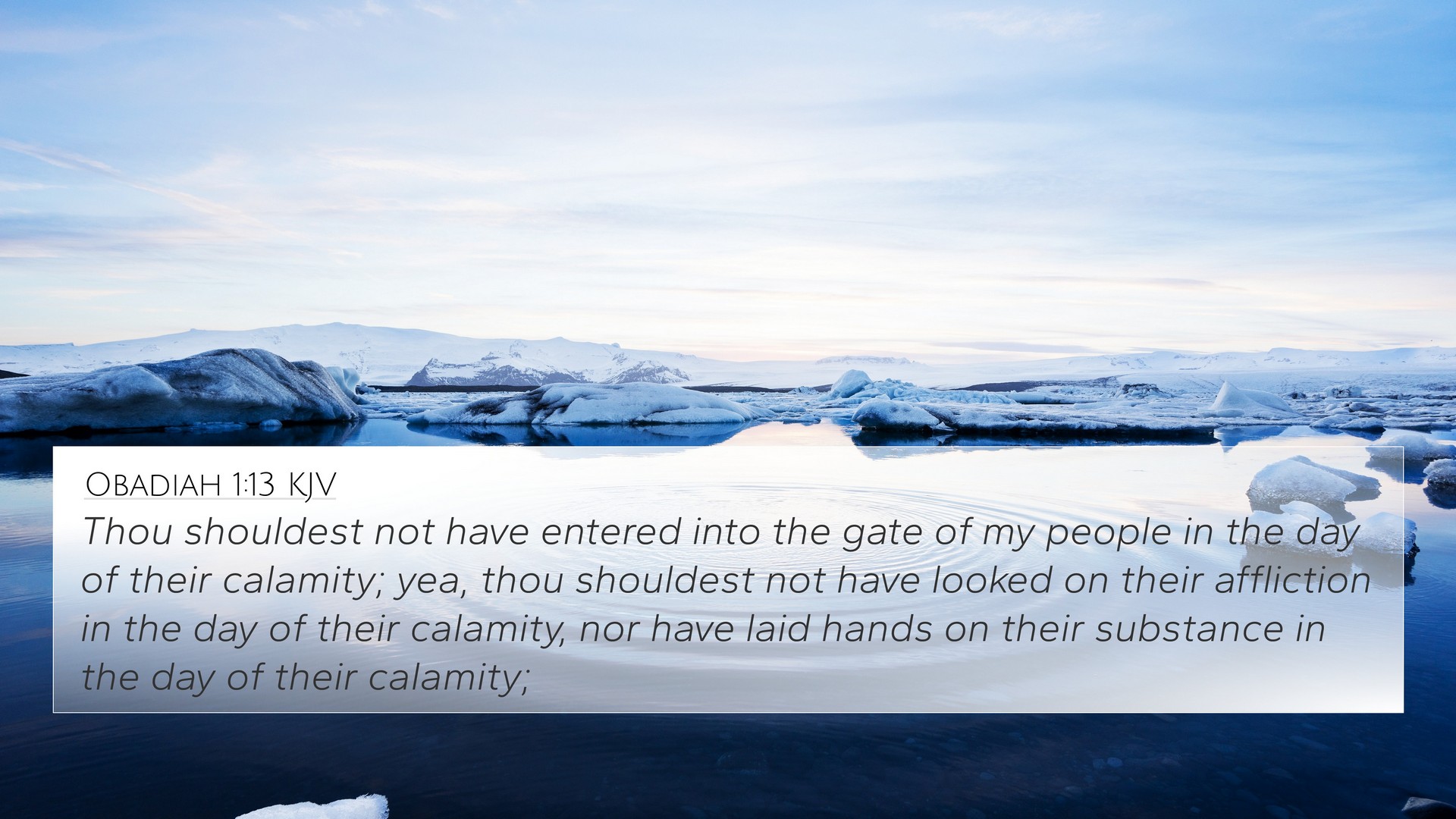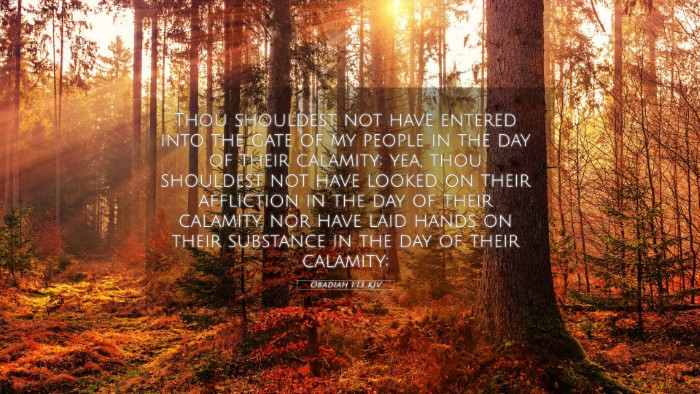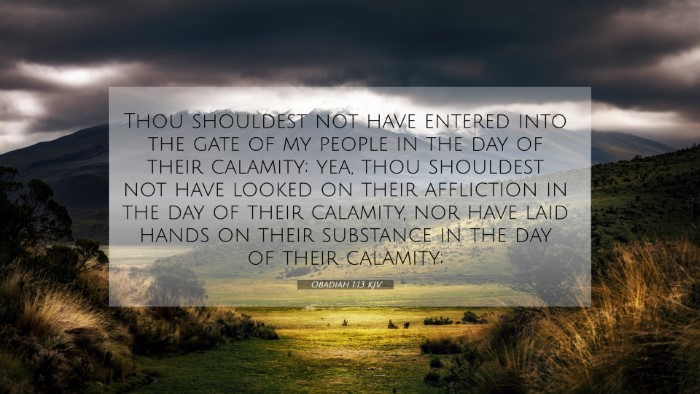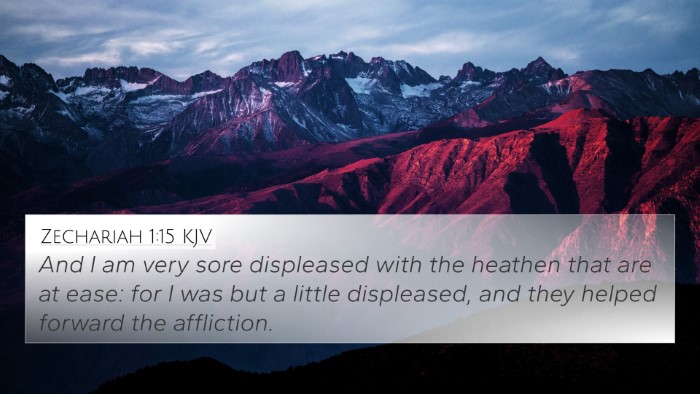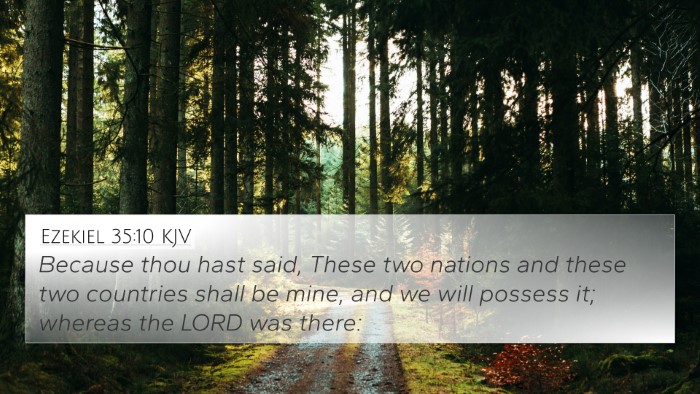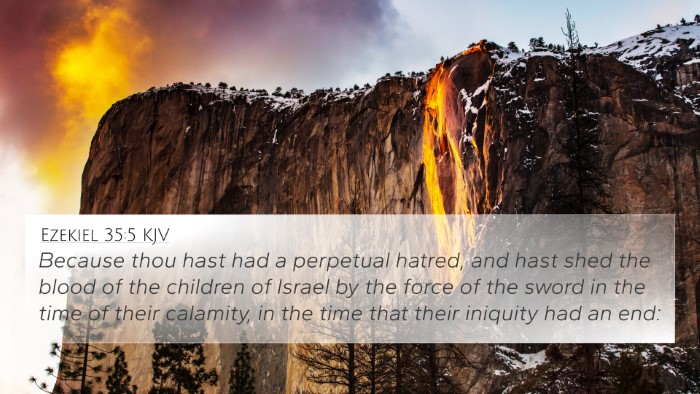Understanding Obadiah 1:13
Obadiah 1:13 says: "Thou shouldest not have entered into the gate of my people in the day of their calamity; yea, thou shouldest not have looked on their affliction in the day of their calamity, nor laid hands on their substance in the day of their calamity."
Summary of Meaning
This verse expresses God's disapproval of Edom's actions during the time of Israel's distress. Edom is accused of taking advantage of Israel's misfortune rather than showing compassion. The verse highlights themes of loyalty, justice, and accountability among nations and individuals.
Commentary Insights
Matthew Henry's Commentary
Henry emphasizes the moral responsibility of nations to act with integrity towards one another. He points out Edom's failure to assist Israel during its time of need, suggesting that this kind of betrayal comes with divine consequences. The verse is a warning against indifference and opportunism in times of others' distress.
Albert Barnes' Notes
Barnes elaborates on the historical context, explaining how Edom, being a relative of Israel, should have acted better. He notes how this verse serves as a testament to God’s justice in holding nations accountable for their actions towards His people. The reference to “day of calamity” denotes a time when one’s true character is revealed.
Adam Clarke's Commentary
Clarke remarks on the significance of the phrasing used in the verse. He interprets the multiple repetitions of "calamity" as emphasizing the seriousness of the situation. Edom's acts of looking upon Israel's suffering and seizing their possessions signify a deeper moral failing, rejecting the covenant relationship they shared.
Cross-References
To gain a deeper understanding of Obadiah 1:13, consider the following related verses:
- Proverbs 24:17-18 - Warns against rejoicing over a brother’s misfortune.
- Isaiah 34:5-6 - Speaks of God's judgment against the nations that turn against His people.
- Jeremiah 49:10-12 - Highlights God’s warnings concerning Edom's pride and cruelty.
- Lamentations 3:34-36 - God does not overlook injustice against His people.
- Malachi 1:2-3 - Discusses God’s love for Israel in contrast to Edom’s disdain.
- Psalm 137:7 - Remembers Edom’s role in Jerusalem's destruction.
- Ezekiel 35:5 - Discusses Edom's eternal enmity against Israel.
Thematic Connections
The passage connects with several biblical themes regarding the treatment of the unfortunate and the consequences of betrayal. Through cross-referencing biblical texts, we see a consistent emphasis on justice, loyalty, and divine retribution. Here are additional points of exploration:
- Justice and Accountability: The biblical narrative consistently conveys that God holds all nations accountable for their actions, particularly regarding injustice towards His people.
- Divine Retribution: Like Edom, nations that act with malice during others' tragedies ultimately face God's judgment.
- Compassion vs. Indifference: The call to show love and assistance in times of need resonates throughout scripture, linking many teachings and exhortations.
Practical Applications
Understanding Obadiah 1:13 encourages believers to reflect on their actions during the hardships of others. It underlines the importance of:
- Empathy: Actively helping those in distress rather than benefiting from their misfortunes.
- Community Support: Building a culture of support where believers care for one another in times of calamity.
- Faithfulness: Staying faithful to God's commands to uphold justice and mercy in all interactions.
Tools for Bible Cross-Referencing
For those interested in exploring more connections between Bible verses, consider these tools:
- Bible Concordance: A helpful resource that lists words and phrases found in scripture with verse locations.
- Bible Cross-Reference Guide: Guides that illustrate connections between passages for deeper study.
- Cross-Reference Bible Study: Methods to explore themes through interconnected scriptures.
- Bible Reference Resources: Comprehensive materials available for identifying scripture parallels.
Conclusion
Obadiah 1:13 serves as a poignant reminder of the moral obligations believers have towards each other, especially in times of trouble. By engaging in comprehensive Bible cross-referencing, one can uncover profound insights about God’s expectations and the consequences of actions against His will. Whether studying for personal growth or sermon preparation, employing tools for cross-referencing can enrich understanding and foster an empathetic community aligned with God's principles.
